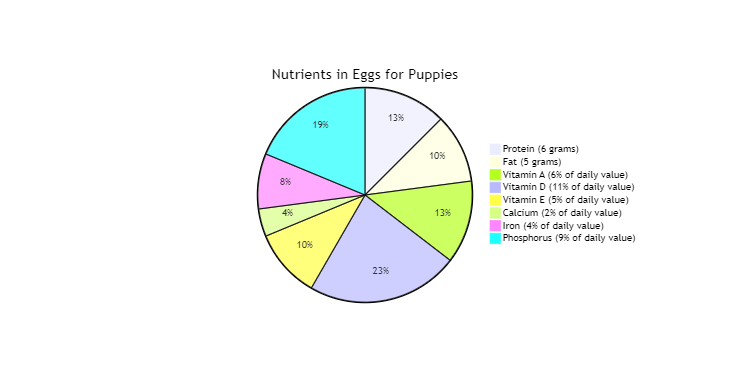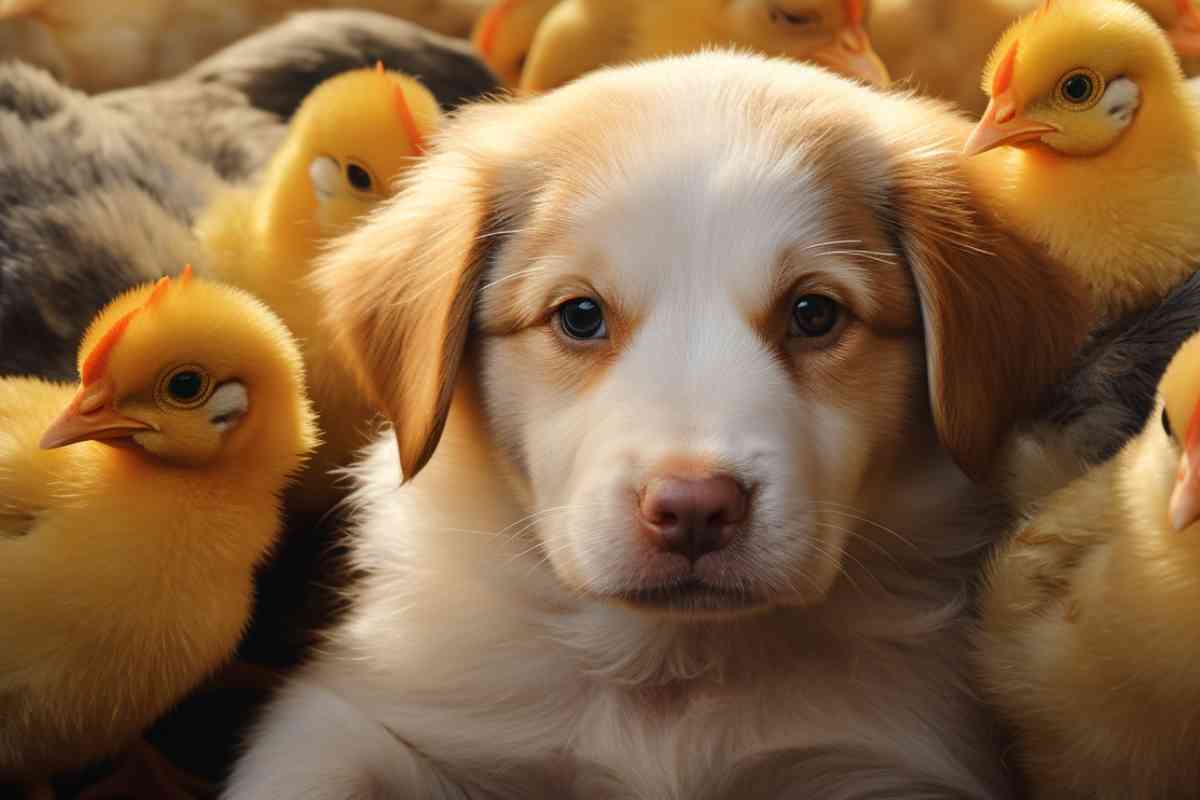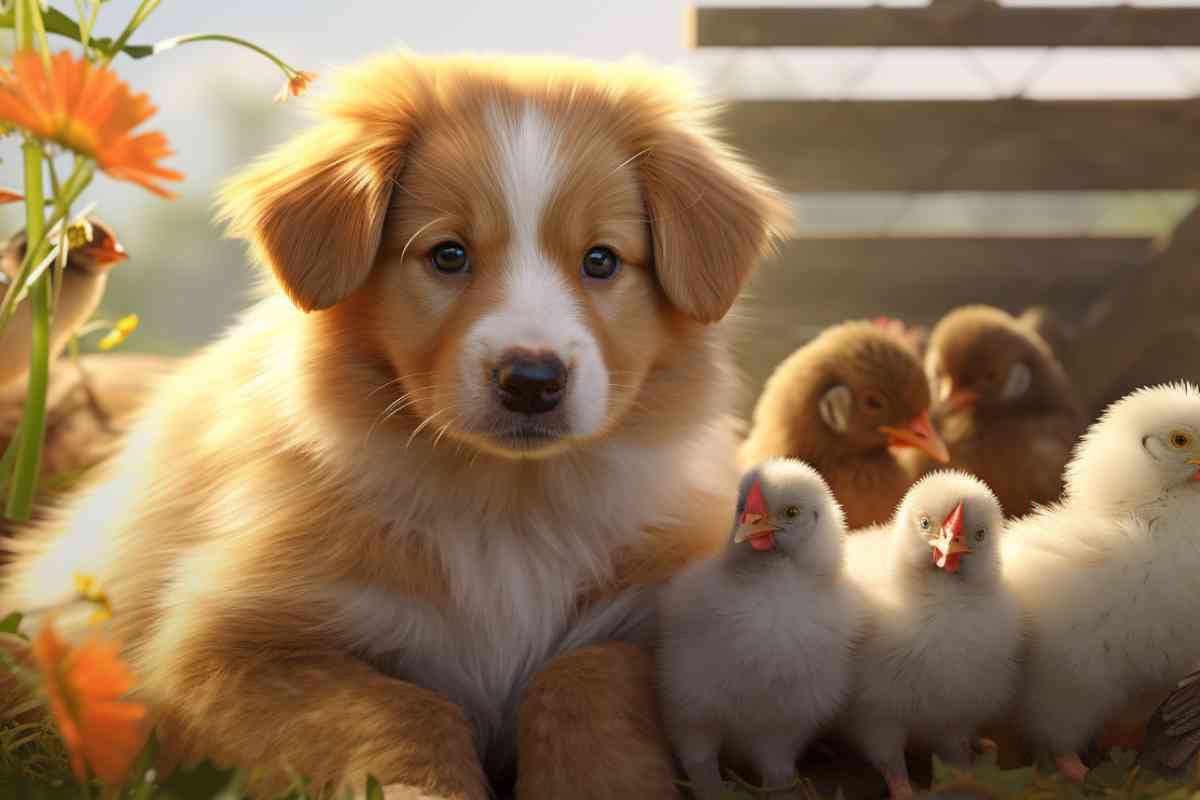At What Age Can Puppies Safely Eat Eggs?
When can my pup join the breakfast club and indulge in the egg-stravaganza? Well, fear not, fellow dog lovers, because we’re about to lay down all the egg-cellent facts for you!
Whether your little furball dreams of eggs sunny-side up or prefers them scrambled, we’re here to dish out the details on when puppies can start eating eggs and how to prepare them.

We won’t just tell you when; we’ll tell you why eggs can be an egg-straordinary addition to your pup’s diet. We’ll also go into just how to introduce eggs to your pup.
Want some other healthy suggestions for your puppy? Cottage cheese is a great option that many dogs love. Brussel sprouts can also be introduced to your pup, but be sure to cook them thoroughly.
At What Age Can Puppies Safely Eat Eggs?
Once your little furball starts munching on solid food, which is typically around 4 to 6 weeks of age, you can introduce eggs into their diet. Eggs are a fantastic source of protein and can be a tasty treat. Start off with small portions. You might want to try mixing a bit of cooked egg into their regular puppy food. Remember, it’s important to cook the egg to eliminate any potential bacteria.
Can Puppies Eat Eggs?
Without a doubt, puppies can enjoy the nutritional benefits of eggs, just like adult dogs. Eggs are powerhouses of essential nutrients that play a crucial role in your puppy’s growth and development.
From building strong muscles to supporting their immune system, eggs offer a plethora of health advantages. Therefore, if you’re contemplating whether to include eggs in your puppy’s diet, the answer is a resounding yes.
Eggs are an excellent source of high-quality protein, which is essential for your puppy’s rapid growth and development. Additionally, they contain valuable fatty acids that contribute to your puppy’s skin and coat health, keeping them looking their best as they explore the world around them.

Are Eggs Good for Dogs?
Cooked eggs are not just good for dogs; they’re excellent! Whether served hard-boiled or scrambled, eggs are a nutritional marvel for our canine companions. These oval wonders provide a remarkable blend of essential fatty acids, vitamins, minerals, and protein. Let’s explore the nutrients in eggs that make them a beneficial addition to your puppy’s diet:
- Protein: Eggs are an exceptional source of high-quality protein, containing all the essential amino acids your puppy needs for growth and repair.
- Fatty Acids: Eggs contain omega-3 and omega-6 fatty acids, which are vital for your puppy’s skin health and a glossy coat.
- Vitamins: Eggs are rich in essential vitamins like vitamin A, D, and B-complex vitamins, which support various bodily functions and contribute to overall well-being.
- Minerals: Eggs contain minerals such as iron, zinc, and selenium, which are essential for various physiological processes.
- Choline: Choline is present in eggs and plays a crucial role in brain development and overall cognitive function.
- Lutein and Zeaxanthin: These antioxidants found in eggs are beneficial for eye health and can support your puppy’s vision as they explore their surroundings.
With all these nutrients packed into one convenient package, eggs are undoubtedly a nutritious addition to your puppy’s diet.

Can Dogs Eat Raw Eggs?
Feeding raw eggs to dogs is not recommended due to potential health risks. Although some pet owners believe that raw foods are more natural and healthier for dogs, raw eggs do not provide any additional nutritional benefits compared to cooked eggs.
In fact, they could pose a risk to your dog’s health. Raw eggs can carry Salmonella, a harmful bacterium that can cause severe gastrointestinal issues in dogs. Studies have found higher rates of Salmonella in dogs fed a raw diet. As loving pet parents, we prioritize our dog’s health and well-being, which is why it’s best to avoid feeding them raw eggs.
Can Dogs Be Allergic to Eggs?
Just like humans, dogs can develop food allergies, and eggs are no exception. While eggs are generally safe and nutritious for most dogs, some may have sensitivities to certain proteins found in eggs.
Consequently, some dogs may develop allergic reactions to eggs, leading to gastrointestinal issues such as vomiting and diarrhea. Additionally, dogs with egg allergies may exhibit skin problems, such as itchiness and inflammation. If you observe any of these signs after feeding your dog eggs, it’s essential to consult with your local veterinarian for proper evaluation and guidance.

Why Are Eggs Good for Dogs?
Eggs are a nutritional powerhouse for dogs, providing an array of essential nutrients that support their overall health. Each part of a cooked egg offers unique health benefits for dogs:
- Egg Yolk: The egg yolk is rich in essential fatty acids, such as omega-3 and omega-6. These fatty acids are essential for building and maintaining healthy cell membranes and promoting a lustrous coat.
- Egg White: The egg white is an excellent source of high-quality protein, containing all the essential amino acids that support your dog’s muscle development and repair.
- Eggshell: Surprisingly, the eggshell is also a valuable source of calcium and other minerals. It can contribute to your dog’s bone health and overall well-being.
- Vitamins and Minerals: Eggs are a natural source of vitamins A, D, E, and B12, as well as minerals like iron, zinc, and selenium. These nutrients play vital roles in various bodily functions and help keep your puppy healthy and thriving.
| Nutrient | Amount per Large Egg |
|---|---|
| Protein | 6 grams |
| Fat | 5 grams |
| Vitamin A | 6% of daily value |
| Vitamin D | 11% of daily value |
| Vitamin E | 5% of daily value |
| Calcium | 2% of daily value |
| Iron | 4% of daily value |
| Phosphorus | 9% of daily value |
How Much Egg Can a Dog Eat?
While eggs are undoubtedly beneficial for dogs, it’s important to serve them in moderation. The appropriate serving size of eggs for your puppy will depend on several factors, including their size, age, activity level, and any existing health conditions. As a general guideline, the following table provides an estimate of the recommended egg serving size based on your puppy’s weight:
| Puppy Weight | Recommended Egg Serving Size |
|---|---|
| 5 – 10 lbs | 1/4 to 1/2 of a small egg |
| 10 – 25 lbs | 1/2 to 1 small egg |
| 25 – 50 lbs | 1/2 to 1 medium egg |
| 50 – 75 lbs | 1 medium to 1 large egg |
| 75+ lbs | 1 to 2 large eggs |
Remember, every dog is unique, and individual dietary needs may vary. To ensure your puppy receives the appropriate amount of eggs in their diet, consulting with your veterinarian is highly recommended. They can provide personalized guidance based on your puppy’s specific needs.

How to Feed Eggs to Your Puppy
Feeding eggs to your adorable puppy can be a delightful experience for both of you. To ensure safety and deliciousness, follow these simple steps:
- Hard-Boiled Eggs: Hard-boiled eggs are one of the safest and most convenient ways to serve eggs to your puppy. To prepare hard-boiled eggs, place them in a pot of cold water and bring it to a boil. Once boiling, reduce the heat and let the eggs simmer for about 9-12 minutes. Afterward, remove the eggs from the pot and place them in cold water to cool. Once cooled, you can chop the eggs into smaller, bite-sized pieces for your puppy to enjoy.
- Scrambled Eggs: Scrambled eggs are another tasty option for your puppy. To prepare scrambled eggs, crack the eggs into a bowl and whisk them until well combined. You can add a small amount of water, mayo, or milk to the eggs for added fluffiness. Next, cook the eggs in a non-stick pan over low to medium heat, stirring gently until they are fully cooked. Be sure not to add any seasoning or salt, as these can be harmful to your puppy. Once the eggs are cooked, let them cool and serve them to your puppy in small, manageable portions.
How to Introduce Eggs to Puppies
- Age Matters: Timing is everything, and the same goes for introducing eggs to your pup. Wait until your little bundle of joy is weaned and comfortably munching on solid food. Usually, this happens around six to eight weeks of age.
- Cook to Perfection: While we may enjoy a sunny-side-up treat, raw eggs are a no-no for our furry friends. They can carry harmful bacteria like salmonella, which can be ruff on your pup’s tummy. The solution? Cook those eggs thoroughly! Whip up some scrambled eggs or serve them boiled, ensuring they are fully cooked before serving.
- Take Baby Steps: Just like puppies take small steps while learning to walk, let’s introduce eggs gradually. Start with tiny egg portions and slowly increase the quantity over time. This approach will help your puppy’s tummy adapt to this new addition and minimize the risk of any tummy upsets.
- Eyes Peeled for Allergies: Puppies, like humans, can have allergies too. Keep a keen eye on your little one after introducing eggs. Watch out for signs of itching, swelling, or vomiting, which could indicate an allergic reaction. If you spot any of these signals, it’s best to pause the egg experiment and consult your vet.
- Balance is Key: Eggs are egg-cellent, but remember, they are just one part of a balanced diet. Don’t let eggs replace your puppy’s regular dog food or treats. Instead, incorporate them as a yummy supplement to their overall nutrition. And, of course, ensure your pup has access to fresh water at all times.

Alternatives to Eggs for Puppies
- Lean Cooked Chicken: Cooked chicken is a fantastic alternative to eggs as it is a lean source of high-quality protein. It contains essential amino acids that support muscle development and repair, just like eggs. Chicken is also gentle on the stomach and easily digestible for dogs.
- Greek Yogurt: Greek yogurt is a rich source of protein and calcium, similar to eggs. It contains probiotics that promote gut health and aid in digestion. However, ensure you choose plain, unsweetened yogurt without any artificial additives or sweeteners.
- Salmon: Salmon is an excellent source of omega-3 fatty acids, which are beneficial for a dog’s skin and coat health. Omega-3s also support joint health and reduce inflammation. Like eggs, salmon provides essential nutrients such as protein and vitamin D.
- Quinoa: Quinoa is a grain-like seed that is gluten-free and packed with protein, making it a great alternative to eggs. It contains all nine essential amino acids, making it a complete protein source. Quinoa is also rich in fiber and various vitamins and minerals.
- Cottage Cheese: Cottage cheese is another protein-rich option that can replace eggs in your dog’s diet. It provides calcium, phosphorus, and B-vitamins, promoting bone health and overall well-being.
- Sweet Potatoes: Sweet potatoes are a nutritious source of complex carbohydrates, vitamins, and minerals. They are rich in fiber and can be easily prepared as a tasty and healthy treat for your dog.
- Pumpkin: Pumpkin is low in calories and high in fiber, which can aid in digestion and promote a healthy weight. It is also a good source of vitamin A, which supports eye health.
- Lean Turkey: Similar to chicken, lean turkey is a protein-packed option that dogs enjoy. It provides essential amino acids for muscle health and is a great alternative for dogs with egg allergies.
Delicious Egg Recipes for Puppies
Egg and Chicken Bowl:
- Ingredients:
- 1 hard-boiled egg, chopped
- 1/4 cup cooked and shredded chicken
- 1/4 cup cooked rice
- 1/4 cup cooked and diced sweet potatoes
- Instructions:
- In a bowl, mix the chopped egg, shredded chicken, cooked rice, and diced sweet potatoes.
- Serve the mixture to your puppy as a nutritious and delicious meal.
2. Puppy-Friendly Egg Muffins:
- Ingredients:
- 2 large eggs
- 1/4 cup cooked and diced vegetables (carrots, peas, spinach, etc.)
- 1/4 cup shredded cheese (optional)
- Instructions:
- Preheat your oven to 350°F (175°C) and lightly grease a muffin tin.
- In a bowl, whisk the eggs and mix in the diced vegetables and shredded cheese (if using).
- Pour the egg mixture into the greased muffin tin, filling each cup about halfway.
- Bake in the preheated oven for 15-20 minutes or until the egg muffins are fully cooked and slightly golden on top.
- Allow the muffins to cool before serving them to your puppy.
3. Egg and Turkey Scramble:
Ingredients:
- 2 eggs
- 1/4 cup cooked and diced turkey
- 1/4 cup cooked and chopped broccoli
- 1 tablespoon olive oil
Instructions: In a skillet, heat the olive oil over medium heat. Add the diced turkey and chopped broccoli, sautéing until heated through. In a bowl, whisk the eggs and pour them into the skillet with the turkey and broccoli. Cook the mixture, stirring gently, until the eggs are scrambled and fully cooked. Serve this tail-waggingly tasty scramble to your pup!
4. Egg and Cheese Bites:
Ingredients:
- 2 large eggs
- 1/4 cup shredded cheddar cheese
- 1/4 cup cooked and diced carrots
- 1/4 cup cooked and diced chicken
Instructions: Preheat your oven to 375°F (190°C) and grease a mini muffin tin. In a bowl, whisk the eggs and stir in the shredded cheese, diced carrots, and chicken. Spoon the mixture into the muffin tin, filling each cup about three-quarters full. Bake for 12-15 minutes or until the egg bites are set and lightly browned. Let them cool before serving these pup-approved cheesy delights!
5. Egg and Sweet Potato Frittata:
Ingredients:
- 3 eggs
- 1/4 cup cooked and mashed sweet potato
- 1/4 cup cooked and diced turkey
- 1 tablespoon chopped parsley
Instructions: Preheat your oven to 350°F (175°C). In a bowl, whisk the eggs and mix in the mashed sweet potato, diced turkey, and chopped parsley. Pour the mixture into a greased oven-safe dish and bake for 20-25 minutes or until the frittata is set. Let it cool slightly before slicing it into pup-sized portions.
6. Veggie-Packed Egg Omelette:
Ingredients:
- 2 eggs
- 1/4 cup cooked and diced mixed vegetables (bell peppers, zucchini, carrots, etc.)
- 1 tablespoon olive oil
Instructions: Heat the olive oil in a non-stick skillet over medium heat. Add the diced mixed vegetables and sauté until tender. In a bowl, whisk the eggs and pour them over the cooked vegetables in the skillet. Cook the omelette, folding it in half, until the eggs are fully cooked. Slice it into bite-sized pieces for your puppy to enjoy!
7. Egg and Salmon Delight:
Ingredients:
- 2 eggs
- 1/4 cup cooked and flaked salmon
- 1/4 cup cooked and mashed sweet potato
- 1 tablespoon chopped dill
Instructions: In a bowl, whisk the eggs and mix in the flaked salmon, mashed sweet potato, and chopped dill. Heat a non-stick skillet over medium heat and pour the egg mixture into the skillet. Cook until the eggs are fully set and the salmon is heated through. Serve this egg-ceptional salmon delight to your pup for a nutritious treat!
8. Egg and Banana Pancakes:
Ingredients:
- 2 eggs
- 1 ripe banana, mashed
- 1/4 cup oat flour (rolled oats ground to a powder)
- 1/4 teaspoon cinnamon
Instructions: In a bowl, whisk the eggs and stir in the mashed banana, oat flour, and cinnamon. Heat a non-stick skillet over medium heat and pour small amounts of the batter into the skillet to form mini pancakes. Cook the pancakes for 1-2 minutes on each side or until golden brown. Let them cool before serving these puppy-approved pancakes!
9. Egg and Apple Bites:
Ingredients:
- 2 eggs
- 1/4 cup cooked and diced apple
- 1/4 cup cooked and shredded chicken
- 1/4 cup cooked and diced sweet potatoes
Instructions: In a bowl, whisk the eggs and mix in the diced apple, shredded chicken, and diced sweet potatoes. Pour the mixture into a greased mini muffin tin, filling each cup about three-quarters full. Bake at 375°F (190°C) for 12-15 minutes or until the egg bites are fully cooked. Let them cool before serving these apple-tizing bites to your pup!
10. Egg and Spinach Quiche:
Ingredients:
- 3 eggs
- 1/4 cup cooked and chopped spinach
- 1/4 cup cooked and diced chicken
- 1/4 cup shredded mozzarella cheese
Instructions: Preheat your oven to 350°F (175°C) and grease a small baking dish. In a bowl, whisk the eggs and stir in the chopped spinach, diced chicken, and shredded mozzarella cheese. Pour the mixture into the greased baking dish and bake for 20-25 minutes or until the quiche is set. Allow it to cool before cutting it into paw-some slices for your pup!
There you have it, eight delightful and nutritious egg recipes that will surely make your puppy’s tail wag with joy! 🐶🍳💕

Be sure to choose a high-quality dog food for your puppy. If you like fresh, natural option, Nom Nom is a good choice.
Conclusion
Eggs are a delightful and nutritious addition to your puppy’s diet. Packed with essential nutrients such as protein, fatty acids, vitamins, and minerals, eggs contribute to your puppy’s overall health and well-being.
Remember to serve eggs in moderation and always cook them thoroughly to ensure your puppy’s safety. By incorporating eggs into your puppy’s diet, you’re providing them with a wholesome and tasty treat that supports their growth and development.
Frequently Asked Questions
What can puppies eat besides dog food?
Puppies can enjoy a variety of human foods in addition to their regular dog food. Some safe and nutritious options include cooked meat, vegetables, and fruits. However, it’s crucial to be cautious and avoid feeding them foods that are toxic to dogs, such as chocolate, grapes, and onions.
How much egg should I feed my puppy?
Eggs can be a delightful treat for your puppy, but like all good things, they should be given in moderation. A general guideline is to offer one egg per week for every 20 pounds of your puppy’s body weight. For instance, if your puppy weighs 10 pounds, half an egg per week would be a suitable amount.
Is it safe for puppies to eat eggs and cheese?
Eggs are generally safe for puppies, but cheese should be enjoyed in moderation. Cheese is high in fat and can lead to digestive issues if consumed in large quantities. If you choose to give your puppy cheese, opt for a low-fat variety and offer it only occasionally.
Can puppies eat egg yolks or just whites?
Puppies can relish both egg yolks and whites. The yolk contains essential nutrients like vitamin A and iron, while the egg white provides a protein boost. Always ensure that the eggs are fully cooked before serving them to your puppy.
When is it safe to start feeding puppies scrambled eggs?
Around 8 weeks of age, puppies can safely enjoy scrambled eggs, provided they are fully cooked. To prevent any digestive upsets, introduce new foods gradually and in small amounts.
How many eggs should I limit my puppy to per day or week?
As mentioned earlier, it’s best to adhere to the guideline of one egg per week for every 20 pounds of your puppy’s body weight. Following this recommendation, a 10-pound puppy should enjoy half an egg per week. Remember, eggs should be fed in moderation and should not comprise a significant portion of your puppy’s diet.